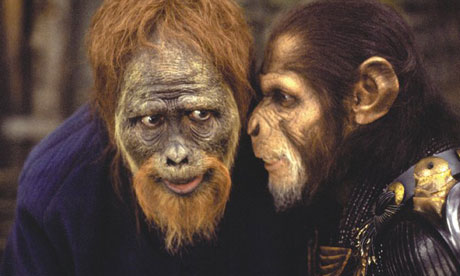 |
| Sweeney discovers his old friend |
Tim Burton’s 2007 film, Sweeney Todd: The Demon Barber of Fleet
Street stars Johnny Depp as Benjamin Barker. A timid barber, Barker was
happily married to his beautiful wife and they had a daughter together. The
villain in the film, Judge Turpin, is jealous and wrongly locks Barker away for
a long time with the intention of stealing his perfect family. His tragic past
results in him taking on a new identity as Sweeney Todd to vow bloody revenge.
The previously good Benjamin Barker disappears and is taken over by a relentless murderer.
Although he kills numerous people,
the audience still sympathizes with him because he’s lost everything he’s ever
cared about. Todd has found a release for the pain he feels in the most gruesome
form possible. The bloodshed really takes off when he teams up with the equally
deranged Mrs. Lovett. After luring in all his victims for a “haircut” he slits
their throats and throws them down a hole. Mrs. Lovett uses the disposed bodies
as the meat to her increasingly popular meat pies. The film takes the act of cannibalism
very lightly and it shows the lengths people will go in order to make it in a
city that’s becoming rapidly industrialized. Mrs. Lovett did not think twice
when it came to baking people in her pies because it is the key to success and
a booming business. London is also a dangerous place in the midst of industrialization.
With the high rate of crime and murder, Mrs. Lovett’s meat pies are a perfect
symbol of the people who don’t make it out of the city alive.
With industrialization revolving
around money, corruption will always be involved. The film tackles the theme of
corruption very obviously in the form of Judge Turpin. His one look at Todd’s
wife was enough for him to tear a family apart. He simply destroys the life of
another man with ease just to fulfill his own jealous desires. He even
sentences a little boy to be hanged to death in his courtroom. (Although this
is more for humorous effect) Even though Sweeney Todd’s actions are
psychopathic, Judge Turpin is equally as inhumane.





